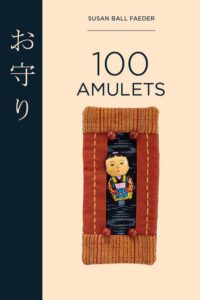SDA Book Club: “100 Amulets” Reviewed by Vivien Zepf
October 6, 2023
100 Amulets by Susan Ball Faeder

Omamori are pocket-sized good luck charms sold in Japanese shrines and temples that convey wishes and protection. In 2019, Susan Ball Faeder created her own collection of omamori–inspired amulets as part of The 100 Day Project. Her time as high school exchange student in a small Japanese village had set her on a lifelong path to stay connected to Japanese culture and traditions as a student, textile shop owner and as a travel tour leader. For Faeder, creating her own daily amulets would combine her cultural expertise with her love of fiber and quilting. Embracing the concept of mottainai (waste nothing), Faeder worked from her stash to create small (no larger than 7 x 4 inches), predominantly tall rectangular pieces, echoing the shape of the Japanese calligraphy wall hangings and temple ink drawings that Faeder admired. The amulets were an expression of her love for textiles and all things Japanese.
Paging through 100 Amulets, you can see each of the amulets she crafted in 2019 and be inspired by the result of an intentional daily practice. You might notice the prevalence of indigo, the pronunciation of which I now know, sounds like ai (eye) and is also a homonym for the word love. Though the words are written with different characters, there’s a little bit of magic in that linguistic synchronicity. You might notice that Faeder has an abundance of orphaned earrings—from as far back as her high school years—that get second lives as embellishments. (We certainly bear witness to the creative possibilities of her statement, “Never throw anything out.”) You’ll also have the opportunity to read Faeder’s daily reflection on each talisman. In these, Faeder provides context for her material choices and explains the cultural significance of an image or design, such as the Seven Lucky Gods. It’s the combination of the images of her amulets and reflections that elevates the book to something more than simple documentation of a daily art practice.
I find it fascinating to get into the mind of an artist. It can be hard to articulate artistic choices and Faeder very succinctly and clearly explains hers. I appreciate that Faeder was vulnerable with some of her thoughts. On day 2 of the project, for example, she wondered if she had bitten off more than she could handle. Faeder’s shared memories and knowledge of Japanese culture, conveyed via her material choices and text, amplify our understanding of the culture she is celebrating with each stitch. Though the initial intent was more personal, Faeder’s art and reflections combine to give readers a mini cultural appreciation course. Her written voice and the brevity of her text means nothing is pedantic or boring.
100 Amulets is a charm of a book, produced in a smaller-than typical size to reference, I hope, Faeder’s amulets. It serves as a worthwhile introduction to Japan and the benefits of a mindful daily art practice filled with introspection and reflection. “What are we but memories?”, queries Faeder at one point. 100 Amulets shows that memories, expressed in art and text, can extend beyond ourselves to open up a bit of the world.
–Vivien Zepf
- Publisher: Independent / Pretzel City Press (buy it here)
If you’ve read this book, leave a comment and let us know what you think!
Do you have a recommendation for a recent fiber-related book you think should be included in SDA’s Book Club? Email SDA’s Managing Editor, Lauren Sinner, to let her know!





2 Comments
Jennifer Gould says
October 6, 2023 at 7:30 am
It looks like a wonderful book! But just to let you know, your spelling of the Japanese word for amulet is Omamori, not omamuri. Check Jisho.org for the correct spelling at https://jisho.org/search/amulet.
Marian F. Wolbers says
December 2, 2023 at 2:01 pm
Thanks, Jennifer, for the comment. SDA quickly made the proper corrections--not to worry! And we truly hope you enjoy reading and viewing these extraordinary 100 AMULETS by Ms. Faeder. A lovely review indeed by Vivien! :-)